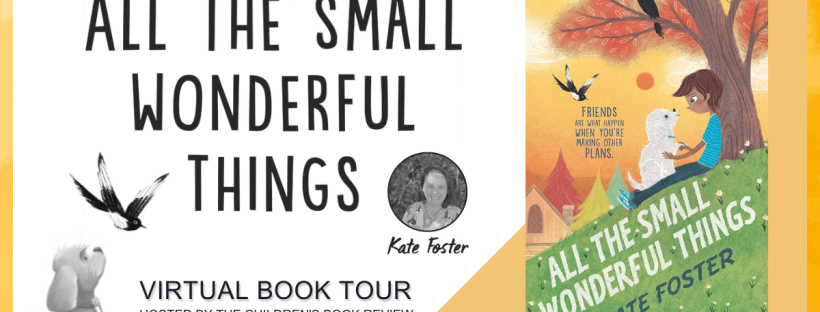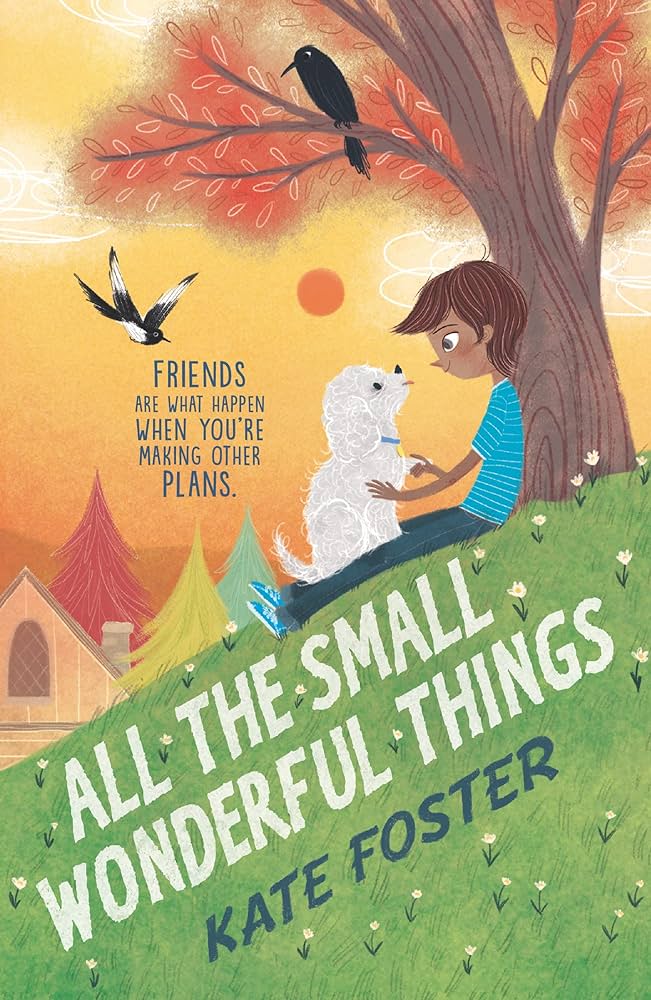I have partnered with Kate Foster and The Children’s Book Review to bring you an interview with author Kate Foster, author of All the Small Wonderful Things. Be sure to check out the book giveaway at the end of the interview for your chance to win an autographed hardcover copy of the book.
All the Small Wonderful Things
Written by Kate Foster
Ages 8+ | 240 Pages
Publisher: Candlewick | ISBN-13: 9781536225808
Publisher’s Book Summary: In an endearing story about an autistic boy and his steadfast furry pal, Alex is convinced that winning a trophy at the dog show will help him make a real friend at last.
Eleven-year-old Alex knows that starting middle school will be a big change, and for an autistic person, change can be terrifying. He is sure that having a friend by his side will help. But how can he make one? Alex devises a plan to impress the kids at school by winning a trophy at the PAWS Dog Show with his trusty sidekick, Kevin the Cockapoo. This should be a walk in the park, right? If only. It turns out that finding a friend is harder than Alex thought—unless, maybe, friendship is about something more than popularity.
This charming story, told through Alex’s clear and honest voice, navigates relationships of all stripes between classmates, new neighbors, family, and, of course, a kid and his dog. After all, friendship isn’t one-size-fits-all—maybe it’s found in the small things where you least expect it.
Amazon
Bookshop
Barnes and Noble

Kate Foster is a children’s author writing about friends, family, and dogs. Originally from a small town in the southeast of England, she now lives on the stunning Gold Coast in Australia with her family and second-hand dogs. She is passionate about encouraging and teaching a wider understanding of autism and mental illness via a positive approach and representation in both her books as well as her presentations and talks.
For more information, visit www.kfosterbooks.com.
INTERVIEW WITH AUTHOR KATE FOSTER:
TYNEA: What or who inspired you to write All the Small Wonderful Things?
KATE: All the Small Wonderful Things was originally inspired by my youngest son and one of my rescue dogs. When, as a family, we went to collect Claude, our cockapoo, the fluffy little dog made an immediate beeline for my son. He stared at him, brought him toys, and followed him around everywhere. That was nine years ago, and still to this day, Claude does the same. The two of them share a bond that is unspoken, unbroken, and so magical.
TYNEA: What are your hopes for this book?
KATE: I have so many hopes and dreams for this book! I hope autistic children see themselves represented fairly and positively in a regular everyday story about making friends. I hope peers, friends, and family members of autistic people understand a little more about what it is to be autistic, and that autistic is simply different, not broken or damaged or something requiring fixing. I hope anyone who works with autistic people sees that making small changes in their choices and approach can make a lifetime of difference for an autistic person. I hope that all children understand better that we can never truly know what’s going on in another person’s life, so patience, kindness, and compassion are essential skills to use, always. And I hope everyone sees the beauty of dogs!
TYNEA: How have dogs been important in your life?
KATE: I have always been rather obsessed with dogs, since as far back as I can remember. I have memories of reading and re-reading books about different dog breeds and staring at the photos for hours on end. When I started school, I recall telling a big fib to everyone that I had a dog who had puppies, and I think when the teacher asked my mother how the puppies were, my parents realized that maybe we should get an actual dog! That’s when we welcomed Josh, my Golden retriever, into the family who was my best friend from age six to eighteen, so for the entirety of my childhood.
Fast forward through the years, I now have two second-hand dogs (poodle-spaniel crosses) who are my best friends and soulmates. They keep me going on the tough days and bring me more joy than I can describe. I am that person who says hello to every dog I pass, which embarrasses my children and husband to no end, but I don’t care! My life goal is to become so rich from my book sales (ha ha ha ha!) that I can one day open my own retirement home in the mountains for old dogs who have, for one reason or another, found themselves homeless.
TYNEA: What do you like most about dogs?
KATE: There isn’t much to dislike really. The way they look is obviously where the love affair and obsession begin, but from then on, they encapsulate everything that’s good in the world. They represent innocence, purity, simplicity, and love. They find joy in the smallest of things, want to be by your side always, and miss you when you leave them even for a minute. Their needs are minimal, and if you show them love and kindness, they will be loyal and worship you until their final hours.
TYNEA: How can pets, such as dogs, help children with autism?
KATE: Not all, of course, but many autistic people find it far easier to communicate and be around animals. Animals are so much simpler to understand than humans. We are such complex, confusing, and rather frustrating creatures. We say things that we don’t always mean, we have individual requirements that we don’t always communicate well, and the rules are forever changing before we even introduce other factors such as time, location and environment.
Animals are far more consistent. Their needs are baseline, their body language is obvious and easy to learn, and they ask for so very little from you before committing 100% to be your friend. They really do make the best lifelong buddies, no matter how we feel or the time of day.
TYNEA: What is one thing you want people to understand about autism?
KATE: One thing only? Oo, that’s tough to answer, but I think I would love for everyone to understand that most autistic people are just like most non-autistic people. We have dreams and hopes, skills and strengths, weaknesses and fears. Just because we may not communicate all of this in the ways society dictates is normal or acceptable, doesn’t mean we’re wrong or should change to make other people feel comfortable. It would be lovely if people stopped talking over us and deciding what’s best for us, but instead let us tell you.



Thank you so much for having me on your blog! I loved answering your questions. 😁
LikeLike
It was wonderful having you on the blog! Thank you for taking the time to share your heart with my readers. My daughter can’t wait to get her hands on your book!
LikeLike